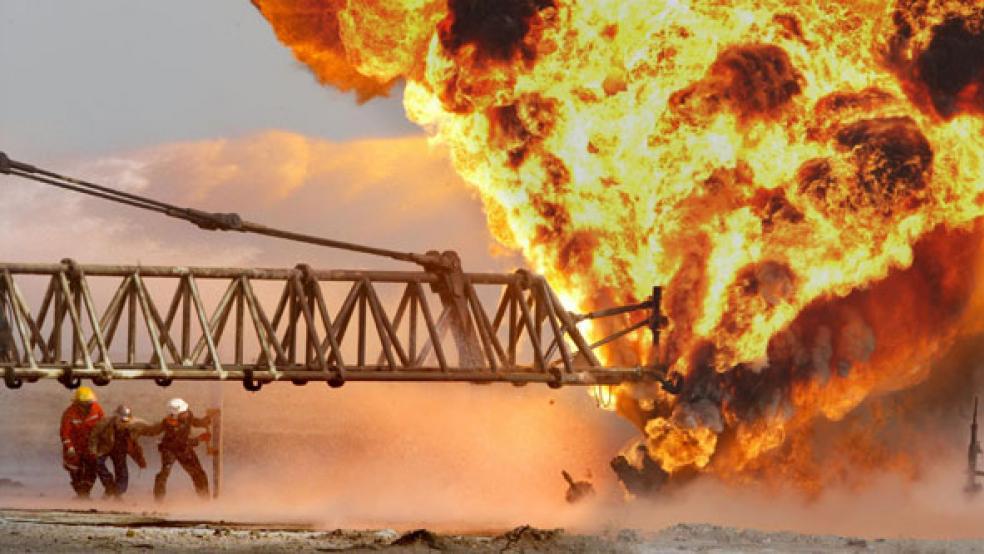The U.S.-led air campaign against ISIS is revving up its efforts to choke off one of the terror group’s main sources of revenue: oil.
Well over a year after the U.S. began launching airstrikes against Islamic State forces, jihadists still control large swaths of territory inside Iraq and Syria that include massive oil fields. The U.S. Treasury estimates ISIS takes in about $500 million in illegal oil revenue annually.
Related: The Fight Against ISIS Has New Price Tag: $5 Billion and Counting
The United States and its allies have been hitting oil fields since the beginning of anti-ISIS military operations, but recently recalibrated how they target such facilities, inflicting significant damage on the group’s ability to fund itself, Defense Department spokesman Col. Steve Warren said Friday during a press briefing.
He said analysis done after previous assaults revealed the strikes were “against pieces of the oil system that were easily repaired and replaced,” sometimes within 24 hours.
That changed starting on Oct. 21 when the Pentagon launched a new operation called Tidal Wave II, a homage to Operation Tidal Wave from World War II, in which the Allies bombed Romanian oil fields controlled by Nazi Germany.
Pentagon analysis of the ISIS strikes showed defense officials how they could strike oil plants “to break them for longer,” possibly for up to a year, said Warren, who declined to say if the department consulted with oil and gas experts.
Related: The Pentagon's $766 Million Afghan 'Slush Fund' Comes Under Scrutiny
"We believe that by cutting off its oil supply we could hasten the destruction of ISIL,” he said, using the other common acronym for the terror organization.
To that end, coalition airstrikes have focused on an oil production site in eastern Syria that the Pentagon estimates provides up to two-thirds of ISIS oil revenue.
Security forces are being careful not to do irreversible damage to oil sites so that they can be used again in the future.
"There will be a time after the war, the war will end, so we don't want to completely and utterly destroy these facilities to where they are irreparable," he said.
The renewed emphasis on drying up ISIS oil revenues comes at the same time Kurdish ground forces, backed by U.S. air power, took back the northern Iraq town of Sinjar from the terror group. The victory by Kurdish Peshmerga forces breaks a vital link between ISIS strongholds in Iraq and Syria and could put even more of a pinch on the organization’s wallet.
Related: Here’s Why Congress Still Won’t Okay the Wars in Iraq and Syria
The operation potentially has the “ability to interrupt some of their financial flows,” Pentagon press secretary Peter Cook said Thursday during a briefing.
Warren said that while the town has been liberated after more than a year of ISIS occupation, it could take days or weeks to fully eliminate jihadist control.
As for the oil fields, Warren said coalition forces don’t have a specific end date in mind, estimating they’re about 70 percent through the operation.
Ironically, details of the renewed push against ISIS oil holdings coincide with even more bombastic rhetoric by Republican presidential frontrunner Donald Trump about how he would go after the group.
"ISIS is making a tremendous amount of money because they have certain oil camps, certain areas of oil that they took away," Trump said Thursday night at a campaign event in Iowa.
"They have some in Syria, some in Iraq. I would bomb the s--- out of 'em. I would just bomb those suckers. That's right. I'd blow up the pipes. ... I'd blow up every single inch. There would be nothing left,” he added.
“And you know what, you'll get Exxon to come in there and in two months, you ever see these guys, how good they are, the great oil companies? They’ll rebuild that sucker, brand new — it'll be beautiful."




